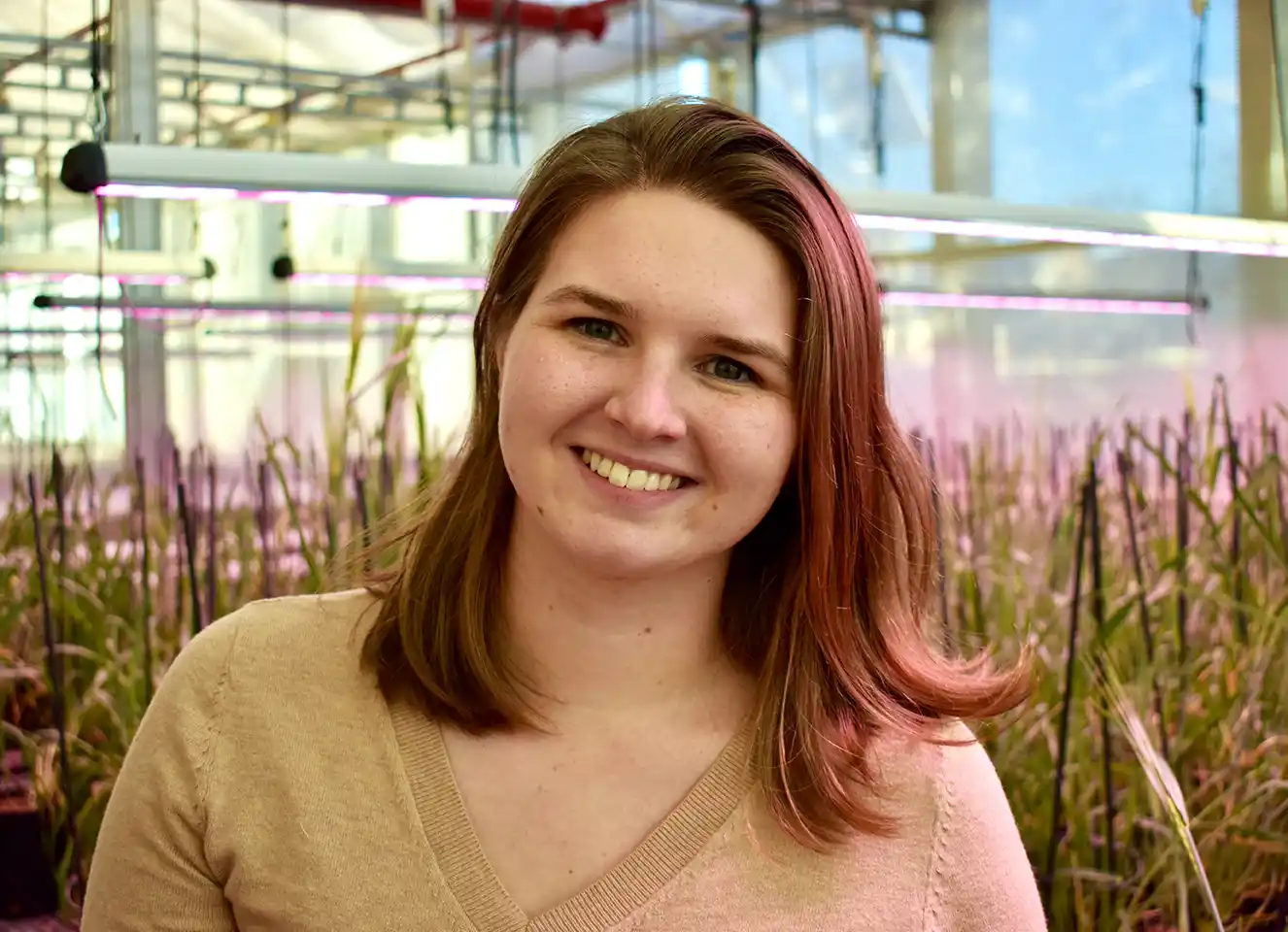Plant geneticist studies improvements for barley production and malting
Meet Jillian Abendroth

Jillian Abendroth wanted to be a researcher as early as pre-school, where she was reading books on archaeology, human anatomy and ecology. Her father, a high school biology teacher, would bring her into the classroom on weekends while students made up work. These were early influences on her decision to go into science, technology, engineering and mathematics (STEM) as she got older.
“At my pre-school end-of-year presentation, when asked what I wanted to be, I told everyone an ‘arch-a-lol-o-gist,’” joked Abendroth. “As an adult, there is something poetic and enticing about the exploration of the unseen and the ability to draw conclusions and make progress in a field invisible to the naked eye. The appeal of genetics is in its seemingly foundational understanding of the life around us.”
She earned her bachelor’s degree in molecular genetics from the University of Rochester and her master’s in crop, soil and environmental sciences from Auburn University. She applied to the U.S. Department of Agriculture’s (USDA) Agricultural Research Service (ARS) Research Participation Program while she was a student.
The USDA ARS Research Participation Program provides opportunities for students, postgraduates, established scientists and faculty to participate in programs, projects and activities at ARS-designated facilities to help ARS solve agricultural problems of high national priority.
Abendroth became a fellow under her mentor Jason Walling, director of the Malt Quality Lab and research geneticist of plants at the Cereal Crops Research Unit in Madison, Wisconsin. Walling’s lab and Abendroth also frequently collaborate with labs led by Marcus Vinje and Mali Mahalingam. However, all the projects she’s been a part of have one thing in common: barley and grain.
In my role, I’ve felt free to make mistakes, learn, explore, question and succeed. I’ve found the experience an opportunity to grow as a scientist and a foundation on which to build my career. It’s also an incredibly unique opportunity to ‘test the waters’ on what type of research inspires, what skills you need to work on, and where you can see yourself and your career.
-Jillian Abendroth
Previous projects include performing water sensitivity and precocious germination studies, which could help farmers to ensure that the barley coming from their fields has a place in malting. Now, Abendroth is researching high-throughput methods of analyzing starch-degrading enzymes in barley. Starch degradation is an essential process that releases sugars to feed yeast in the beer fermentation process. Methods of high throughput enzyme analysis determine a barley’s malt quality characteristics and enable exact, efficient and rapid research in the malt industry. Because her research is so varied, Abendroth sees it as having wide potential and multiple uses.
“If the broad goal of agriculturalists is to feed the world, then my work is a multifaceted devotion to this cause, addressing the concerns through economic, direct and indirect avenues,” said Abendroth. “It progresses the industry understanding of barley, particularly into malting barley characteristics. The societal and individual benefit from it is the improvement of beer quality and process efficiency.”
Analysis of grain mineral accumulation extends outside the realm of malt production and potentially into human health. Determining barley varieties with increased micronutrients may make them exciting prospects for human consumption and a better understanding of the genetic underpinning of the traits combats global nutrient deficiency.
Abendroth helped publish a paper on the research titled “Identification of Genomic Loci Controlling Grain Macro and Micronutrient Variation in a Wild Barley (Hordeum Vulgare Spp. Spontaneum) Diversity Panel” in the journal Agronomy. Additionally, she created and submitted a poster to the Wild Barley Diversity Panel at the Plant and Animal Genome annual conference.
As a fellow, Abendroth is learning several skills and creating unique experiences. Computation, an area of study she hadn’t been familiar with prior, has become a large part of her fellowship. After discovering that she enjoyed it, Abendroth is incorporating similarly new skills in bioinformatics, coding and data analysis. She also mentored a high school student in molecular techniques to bring her knowledge as a geneticist and ORISE USDA fellow to the next generation.
Abendroth describes her overall impression of the fellowship as “indescribably positive,” and recommends the program to others.
“In my role, I’ve felt free to make mistakes, learn, explore, question and succeed. I’ve found the experience an opportunity to grow as a scientist and a foundation on which to build my career,” she said. “It’s also an incredibly unique opportunity to ‘test the waters’ on what type of research inspires, what skills you need to work on, and where you can see yourself and your career.”
She also thanks her mentors and co-scientists for making her fellowship so enriching and impacting the way she will carry herself throughout future research. Her colleagues are her favorite part of the fellowship, and she has made life-long friends.
After her fellowship Abendroth will begin studying for her doctoral degree in plant breeding and plant genetics at the University of Wisconsin-Madison. Whether as a research fellow or a student, Abendroth is passionate about plants and genetics and her research into barley has helped expand the scientific community’s overall genetic knowledge.
The USDA ARS Research Participation Program is funded by USDA and is administered through the U.S. Department of Energy’s (DOE) Oak Ridge Institute for Science and Education (ORISE). ORISE is managed for DOE by ORAU.

